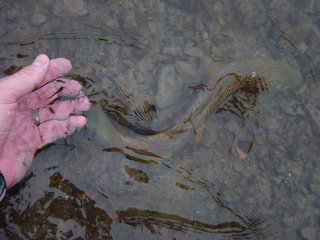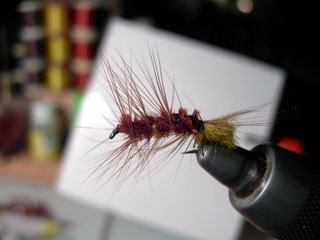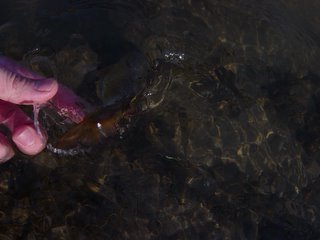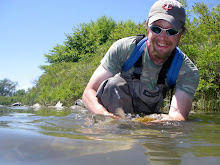Monday, January 30, 2006
Friday, January 27, 2006
Bipartisan?.... B.S.
The following are quotes from prominent Republican and conservative talking heads, back when Clinton committed troops to Bosnia. Funny how positions change when your man takes power...
"You can support the troops but not the president" ---Rep. Tom Delay (R-TX)"
"[The] President . . . is once again releasing American military might on a foreign country with an ill-defined objective and no exit strategy. He has yet to tell the Congress how much this operation will cost. And he has not informed our nation's armed forces about how long they will be away from home. These strikes do not make for a sound foreign policy." ---Sen. Rick Santorum (R-PA)
"American foreign policy is now one huge big mystery. Simply put, the administration is trying to lead the world with a feel-good foreign policy." ---Rep. Tom Delay (R-TX)
"If we are going to commit American troops, we must be certain they have a clear mission, an achievable goal and an exit strategy." ---Karen Hughes, speaking on behalf of George W. Bush
"I had doubts about the bombing campaign from the beginning . . . I didn't think we had done enough in the diplomatic area." ---Senator Trent Lott (R-MS)
"Well, I just think it's a bad idea. What's going to happen is they're going to be over there for 10, 15, maybe 20 years." ---Joe Scarborough (R-FL)
"I cannot support a failed foreign policy. History teaches us that it is often easier to make war than peace. This administration is just learning that lesson right now. The President began this mission with very vague objectives and lots of unanswered questions. A month later, these questions are still unanswered. There are no clarified rules of engagement. There is no timetable. There is no legitimate definition of victory. There is no contingency plan for mission creep. There is no clear funding program. There is no agenda to bolster our over-extended military. There is no explanation defining what vital national interests are at stake. There was no strategic plan for war when the President started this thing, and there still is no plan today"-Rep. Tom Delay (R-TX)
"Explain to the mothers and fathers of American servicemen that may come home in body bags why their son or daughter have to give up their life?" ---Sean Hannity, Fox News, 4/6/99
"Victory means exit strategy, and it's important for the President to explain to us what the exit strategy is."-Governor George W. Bush (R-TX)
After Reading Tu Fu I Go Off To Catch Rough Fish In the Cannon River
“The river carries off the moon
To set beyond the border.” Tu Fu
Together, carp gather like shadows in the slack
current - moving like dark thoughts through
the moon’s shadow. We are joined by a line
the exact thickness of desire: a line that stretches
into current moving below the surface in ways
only the moon understands; pulled by its fullness
to extremes that become more than only the Cannon
River. That become all rivers stretching the borders
of what I know for a fact to be true. In the settling
darkness - me, the moon, this carp all balance on
the sudden edge of daylight and dark. All the while,
doing my best to stay connected.
When the fish
comes to hand in the shallows, offering itself
like the answer to some question that I don’t
recall asking, I handle it gently. Then let it go.
Thursday, January 26, 2006

The kid had his first underwater experience a couple nights ago. He was playing with a big plastic cup in the bath, when Dad leaned him back to rinse out hs hair... the cup was full of water though, so it all poured right on his face! This shocked and scared the little guy so much that he rolled away from Dad and immersed himself in the bathwater... eyes wide in shock, he tried to cry. Dad pulled him out before he attempted to draw breath though... After sobbing for just a few seconds he was okay - back to playing with the plastic cup.
 More winter fishing pics.... This rainbow is absolutely beautiful. There have been no recorded instances of rainbow trout reproducing in the wild of SE MN; this fish was stocked at some point... Fought hard - pulled me into some debris even. The day was windy and wild, and like always I was thankful for the opportunity to be out and about in our sight-filled corner of the state.
More winter fishing pics.... This rainbow is absolutely beautiful. There have been no recorded instances of rainbow trout reproducing in the wild of SE MN; this fish was stocked at some point... Fought hard - pulled me into some debris even. The day was windy and wild, and like always I was thankful for the opportunity to be out and about in our sight-filled corner of the state.



Program keeps mattresses from landfills
ENVIRONMENT: Goodwill Industries separates mattresses into their components - wood, metal, cotton and foam - for recycling.
BY JOHN MYERS
DULUTH NEWS TRIBUNE STAFF WRITER
They're using everything but the squeak.
That's how efficient Goodwill Industries in Duluth is at recycling mattresses, and its efforts are being rewarded.
Goodwill's mattress recycling program won a Governor's MnGREAT (Minnesota Government Reaching Environmental Achievements Together) Award this week for environmental stewardship, on top of an award earlier this month from the Minnesota Recycling Association.
For entire article: http://www.duluthsuperior.com/mld/duluthsuperior/13704477.htm
Monday, January 23, 2006
Thursday, January 19, 2006

His vocab is up to 20+ words folks... We counted last night. I remember thinking to myself: I can't wait until he can repeat what we say to him... Well that time is right about now!
Yellow: yey-oh or yey-roh
Apple: abba (said for first time last night)
Moo: mooooooo (of course!)
Fish: issss (usually in a whisper)
Wednesday, January 18, 2006
Thinking Like a Mountain
By Aldo Leopold
[This is just one example of Leopold's wonderful work. If you don't want to read the entire selection, at least skip down to the bolded line and start there... for the complete text, see A Sand County Almanac [absolute, must-read], or go here: www.eco-action.org]A deep chesty bawl echoes from rimrock to rimrock, rolls down the mountain, and fades into the far blackness of the night. It is an outburst of wild defiant sorrow, and of contempt for all the adversities of the world. Every living thing (and perhaps many a dead one as well) pays heed to that call. To the deer it is a reminder of the way of all flesh, to the pine a forecast of midnight scuffles and of blood upon the snow, to the coyote a promise of gleanings to come, to the cowman a threat of red ink at the bank, to the hunter a challenge of fang against bullet. Yet behind these obvious and immediate hopes and fears there lies a deeper meaning, known only to the mountain itself. Only the mountain has lived long enough to listen objectively to the howl of a wolf.
Those unable to decipher the hidden meaning know nevertheless that it is there, for it is felt in all wolf country, and distinguishes that country from all other land. It tingles in the spine of all who hear wolves by night, or who scan their tracks by day. Even without sight or sound of wolf, it is implicit in a hundred small events: the midnight whinny of a pack horse, the rattle of rolling rocks, the bound of a fleeing deer, the way shadows lie under the spruces. Only the ineducable tyro can fail to sense the presence or absence of wolves, or the fact that mountains have a secret opinion about them.
My own conviction on this score dates from the day I saw a wolf die. We were eating lunch on a high rimrock, at the foot of which a turbulent river elbowed its way. We saw what we thought was a doe fording the torrent, her breast awash in white water. When she climbed the bank toward us and shook out her tail, we realized our error: it was a wolf. A half-dozen others, evidently grown pups, sprang from the willows and all joined in a welcoming melee of wagging tails and playful maulings. What was literally a pile of wolves writhed and tumbled in the center of an open flat at the foot of our rimrock.
In those days we had never heard of passing up a chance to kill a wolf. In a second we were pumping lead into the pack, but with more excitement than accuracy: how to aim a steep downhill shot is always confusing. When our rifles were empty, the old wolf was down, and a pup was dragging a leg into impassable slide-rocks.
We reached the old wolf in time to watch a fierce green fire dying in her eyes. I realized then, and have known ever since, that there was something new to me in those eyes - something known only to her and to the mountain. I was young then, and full of trigger-itch; I thought that because fewer wolves meant more deer, that no wolves would mean hunters' paradise. But after seeing the green fire die, I sensed that neither the wolf nor the mountain agreed with such a view.
Tuesday, January 17, 2006

"There isn't any symbolism. The sea is the sea. The old man is an old man. The boy is a boy and the fish is a fish. The shark are all sharks no better and no worse. All the symbolism that people say is shit. What goes beyond is what you see beyond when you know."
Ernest Hemingway, 1952

"Then the fish came alive, with his death in him, and rose high out of the water showing all his great length and width and all his power and his beauty" (94). It crashed into the sea, blinding Santiago with a shower of sea spray. With the glimpse of vision he had, Santiago saw the slain beast laying on its back, crimson blood disseminating into the azure water. Seeing his prize, Santiago says, "I am a tired old man. But I have killed this fish which is my brother and now I must do the slave work" (95).
Friday, January 13, 2006
Excerpt from
For love of the land, owners preserve its beauty for future
Star Tribune, January 7, 2006
by Kevin Giles
[READ ENTIRE ARTICLE at http://www.startribune.com/462/story/169804.html]
As John Baird walks his snowy land in Washington County, ears reddened by the wind and boots cinched around his green corduroy pants, he speaks emphatically for conservation, declaring that a "McCastle" will never be built there.
"Look at pictures on your calendars," he said, arguing that people need open spaces. "They're not pictures of shopping malls or industrial space."
It was here, in a meadow north of Stillwater, where Baird, 81, and his wife, Nancy, made their promise to the land. With development closing in, they transferred the rights to more than 150 acres to the Minnesota Land Trust, ensuring the land will remain open for future generations.
The Bairds aren't alone in their passion. A growing number of rural landowners in the metro area and western Wisconsin are resisting overtures from developers -- some involving millions of dollars -- in favor of less lucrative but more rewarding propositions that will preserve their land as open space.
"Property protection has really taken off," said Michelle Dingwall, development director at the West Wisconsin Land Trust in Menomonie. "People are starting to take matters into their own hands. They don't necessarily trust others. They don't want to see it subdivided or developed."
Thursday, January 12, 2006

Interesting article in NYT that kind of sums up what I've been feeling for years... The fact that "environmentalists" - folks who care about things basic to life (air, water, land) are noted as societal exceptions.... they're goofy tree-huggers, etc. Maybe one day we'll actually reach a point at which we say that "being green" isn't special, crazy or unique... it's just something that MAKES SENSE. I'm getting really sick and tired of people asking me "are you doing that for environmental reasons?" or folks saying "you have a strong environmental ethic," etc. FOR BLEEPS SAKE, I do things (some things that is, whenever I can anyway - I'm far from "perfect") that I see as generally good for community/society and our common efforts at a good life! I don't live my life according to "max profit" and/or convenience and to heck with all else... I try my best to think about kids, folks, land, images, beauty, experience.... come on, why is that so nutty? Why does that need a special label? Maybe one day people who DON'T care about life's basic components will be the exception.... maybe call them the "moneyists"?
In summary, the problem with environmentalism as a movement, is that it has to exist as a movement.
By Randy Newman
The Great Nations of Europe had gathered on the shorethey'd conquered what was behind them and now they wanted moreso they looked to the mighty ocean and took to the western seaThe great nations of europe in the 16th centuryHide your wives and daughters, hide the groceries tooThe great nations of europe comin throughThe Grand Canary Islands first land to which they camethey slaughtered all the canaries there which gave the land its namethere were natives there called guanches, guanches by the scorebullet's, disease the portugese, they weren't there any morenow they're gone, they're gone, they're really goneyou never seen anyone so gonethere's pictures in a museum, some lines written in a bookbut you won't find a live one, no matter where you lookHide your wives and daughters, hide the groceries tooThe great nations of europe comin throughcolumbus sailed for india found salvidor insteadhe shook hands with some indians and soon they all were deadthey got tb and typhoid and athletes foot, diptheria and the flu'scuse me great nations comin throughbalboa found the pacific and on the trail one dayhe met some friendly indians whom he was told were gaysoooooooooooooohe had them torn apart by dogs on religious grounds they saythe great nations of europe were quite holy in their waynow they're gone, they're gone, they're really goneyou never seen anyone so gonesome bones hidden in a canyon some paintings in a cavethey're no use tryin to save them, there's nothin left to savehide your wives and daughters, hide your sons as wellwith the great nations of europe you never can tellwhere you and i are standing at the end of a centuryeuropes have sprung up everywhere as even i can seebut there on the horizon is the possiblitythat some bug from out of africa might come for you and medestroying everything in it's path from sea to shining sealike the great nations of europe in the 16th century
Monday, January 09, 2006
"In their later evolution, however, they became a code of sportsmanship, a self-imposed limitation on sport. On them is a distinctively American tradition of self-reliance, hardihood. woodcraft, and marksmanship. These are intangibles, but they are not abstractions. Theodore Roosevelt was a great sportsman, not because he hung up many trophies, but because he expressed (2) this intangible American tradition in words any schoolboy could understand. A more subtle and accurate expression is found in the early writings of Stewart Edward While (3). It is not far amiss to say that such men created cultural value by being aware of it, and by creating a pattern for its growth. Then came the gadgeteer, otherwise known as the sporting-goods dealer. He has draped the American outdoorsman with an infinity of contraptions, all offered as aids to self-reliance, hardihood. woodcraft, or marksmanship, but too often functioning as substitutes for them. Gadgets fill the pockets, they dangle from neck and belt. The overflow fills the auto trunk, and also the trailer. Each item of outdoor equipment grows lighter and often better, but the aggregate poundage becomes tonnage. The traffic in gadgets adds up to astronomical sums, which are soberly published as representing "the economic value of wildlife." But what of cultural values? As an end-case, consider the duck hunter, sitting in a steel boat behind composition decoys. A put-put has brought him to the blind without exertion. Canned heat stands by to warm him in case of a chilling wind. He talks to the passing necks on a factory caller, in what he hopes are seductive tones: home lessons from a phonograph record have taught him how. The decoys work, despite the caller: a flock circles in. It must be shot at before it circles twice, for the marsh bristles with other sportsmen, similarly accoutered, who might shoot first. He opens up at 70 yards, for his polychoke is set for infinity, and the ads have told him that Super-Z shells, and plenty of them, have a long reach. The nock flares. A couple of cripples scale off to die elsewhere. Is this sportsman absorbing cultural value? Or is he just feeding minks? The next blind opens up at 75 yards: how else is a fellow to get some shooting? This is duck-shooting, model 1943. It is typical of all public grounds, and of many clubs. Where is the go-light idea, the one-bullet tradition? The answer is not a simple one. Roosevelt did not disdain the modern rifle; White used freely the aluminum pot, the silk tent, dehydrated foods. Somehow, they used mechanical aids, in moderation, without being used by them. I do not pretend to know what is moderation, or where the line is between legitimate and illegitimate gadgets. It seems clear, though, that the origin of gadgets has much to do with their cultural effects. Homemade aids to sport or outdoor life often enhance, rather than destroy, the man-earth drama; he who kills a trout with his own fly has scored two coups, not one. I use many factory-made gadgets myself. Yet, there must be some limit beyond which money-bought aids to sport destroy the cultural value of sport."

















